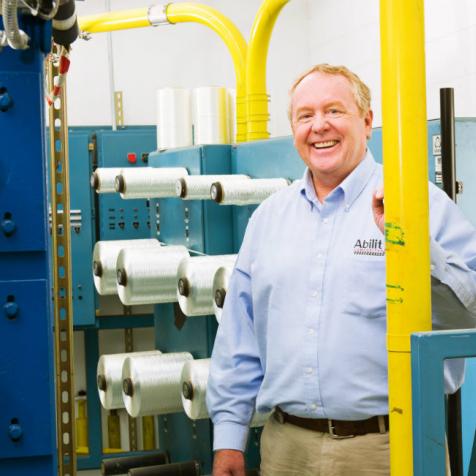
Ability Composites
By Eric Peterson | Aug 30, 2015
Company Details
Location
Loveland, Colorado
Founded
2013
Ownership Type
Private
Employees
10
Products
Components for Aerospace and Consumer Goods
Loveland, Colorado
Founded: April 2013
Privately owned
Employees: 10
Founder and CEO Frank Roundy has spun his composites shop out of larger parent companies to focus on aerospace, medical, and industrial projects.
Roundy has worked in composites since 1984, starting with aerospace in California before moving to Colorado to work for StorageTek making robotic composite arms in the mid-1990s. The arms would grab reels from a library of magnetic tapes, but the technology went obsolete and Roundy's division was spun off as ComposiTek in 2000, and acquired by SA Technology in 2004.
After SA shut down in 2013, Roundy bought the assets and launched Ability. "I've been with this equipment since 1996," he says. "It's been a tax write-off for four different companies."
Diversification has been an emphasis from the start. "We try to do one-third in medical, one-third in industrial, and one-third in aerospace," says Roundy. "You get out of the booms and busts."

In 2014, the company was slightly heavy on industrial, and 40 percent of sales are in medical this year, but Ability is pretty close to hitting those targets.
"Our ideal customer is a company that their expertise may not be in composites, but they need composites," says Roundy. "For many applications, it's the only material that will work."
Projects are largely covered by nondisclosure agreements, but Roundy cites robotic arms that unload plastic injection molded parts more efficiently than gravity as an example of how Ability helps one manufacturing client.
In aerospace, Ability is working for clients like Boeing, Lockheed Martin, and Sierra Nevada, and one industrial client, Kurion, uses the company's parts in the robotic arms used in cleanup at the nuclear disaster in Fukushima, Japan.

Ability helps clients with design and manufacturability, Roundy adds, with an eye on the bottom line. "People come in and say, 'Can you build this?’ We can build anything, but can you sell it to customers for what it cost to build?’"
Roundy says Ability's filament-winding capabilities help set the shop apart, and it uses a 5-axis router to make the tools to lay the composites up on. The company works with local machine shops and painters, but sources most of its materials from out of state. Regardless of location, he adds, "You want to take care of your vendors."
Sales have jumped by double digits annually since the launch, and now that Ability is its own company, Roundy sees a bright future. "It's nice to be able to invest back in the company and it's nice to have a focus. "StorageTek was an electronics company. Manufacturing innovation wasn't what they were looking for."
Challenges: Taxes. "It is brutal for small businesses," says Roundy. "You make money but that money just goes back into your operating account. It's not like it goes in your back pocket."
Opportunities: "We'd like to get more filament-winding jobs," says Roundy. "We're working with several companies to produce pressure vessels for aerospace and satellite applications."
One opportunity he's taking a pass on is composite sporting goods -- the margins are "too tough.”

Needs: Staying at the front of the curve of new technology. "We keep an eye on 3D printing and look at that as being a paradigm change," says Roundy. "One of the big parts of composites is making tools. If you could 3D print it, it could be less expensive."
He anticipates buying a 3D printer in the near term, but he's not financing it. "Everything we buy, we buy with cash. We're a conservative company."
